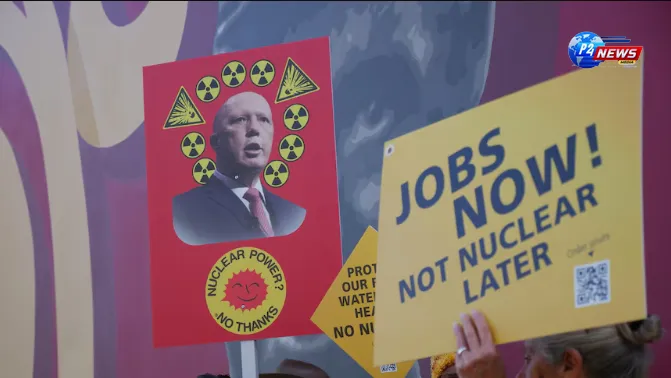Regional communities have voiced their concerns and opinions regarding the federal Coalition's proposal for seven nuclear reactors across Australia. During a parliamentary inquiry, residents expressed the need for more information while being advised to await further details.
Peter Dutton, the leader of the opposition, has articulated his ambitious plan to establish seven nuclear reactors throughout Australia, asserting that this initiative is crucial for ensuring a steady power supply. Yet, residents in the communities proposed as hosts for these facilities express bewilderment and frustration over the lack of clarity surrounding the Coalition's intentions. Hunter Valley resident Tony Lonergan encapsulated this sentiment, questioning, "What are we actually signing up for?" Many in the area are enthusiastic about the potential development, yet remain utterly uninformed about the implications and details that accompany such a significant undertaking.
So far, Mr. Dutton has shared the proposed locations for the reactors along with estimated costs. The Coalition's strategy focuses on repurposing the sites of seven coal-fired power stations that have either ceased operations or are set to close, specifically targeting locations in Queensland, New South Wales, South Australia, Victoria, and Western Australia.
Local sentiments reflect a growing discontent regarding the perceived treatment of their regions by politicians. Lithgow resident Tom Evangelidis voiced his concerns, expressing a feeling that political leaders regard their communities as apathetic and easily manipulable. As the Coalition moves forward with its nuclear aspirations, many residents remain on edge, feeling sidelined in conversations that directly impact their lives and environment.
Compounding these worries, the Labor Party has initiated a federal inquiry into nuclear power, which generated an impressive number of submissions—over 800—from diverse stakeholders, including individuals, business owners, and various interest groups. The House Select Committee on Nuclear Energy has embarked on a tour to gather firsthand accounts from residents living in the proposed reactor sites, yet many remain dissatisfied with the scant details provided.
Throughout the inquiry, one persistent request has been for the Coalition to clarify various critical aspects, including the specific technologies that will be employed, water usage, waste storage solutions, and safety measures. Wayne McAndrew, a former executive from the NSW mining union, expressed his disappointment over the lack of substantial information following a regional hearing, highlighting the pressing concerns of land use and environmental safety that remain unanswered.
In response to these community calls for clarity, Liberal MP Ted O'Brien has repeatedly assured witnesses of an extended consultation process, promising that community members would have the opportunity to seek answers over a two-and-a-half-year period. However, these reassurances have done little to quell the anxieties of those in attendance. Patsy Wolfenden, a representative from the Mingaan Wiradjuri Aboriginal Corporation, criticized the inadequate support being offered to communities, arguing that the complexity of the reports should not place an undue burden on residents trying to navigate these issues.
Academic voices like Associate Professor Naomi Godden have echoed these frustrations, asserting that political agendas are being thrust upon communities without genuine engagement or consent. The Coalition has made claims regarding job security for those in the coal industry facing unemployment as power stations shutter, yet skepticism remains. Local resident Adrian Cosgriff has urged for a shift in focus toward the renewable energy sector, suggesting that coal workers might more effectively transition into emerging energy fields.
Daniel Graham, representing the Australian Manufacturing Workers' Union in Collie, raised his own uncertainties about the timeline for nuclear projects in relation to current job availability. The complexities of integrating nuclear energy into existing labor markets have left many workers questioning their future prospects.
The dialogue around renewable energy has similarly ignited contention within regional areas. Farmers have voiced their frustrations regarding the expansion of solar and wind farms, asserting that these developments often occur without adequate consultations. Landholder Nigel Wood, who lives near the Liddell power station, described the experience as torturous, while fellow farmer Therese Creed expressed concerns over the substantial agricultural land that is being allocated for renewable projects. She voiced a preference for nuclear energy, emphasizing the potential for Australian self-sufficiency in energy production rather than relying on foreign imports.
In spite of the numerous concerns raised during the inquiry, Labor MP Dan Repacholi, who chairs the committee, remains optimistic that valuable insights are being gathered. He emphasized the importance of striking a balance between community perspectives and expert opinions throughout the inquiry process. Various sessions have been conducted in both urban and rural settings, with adjustments made to accommodate the specific contexts of regional communities.
As the inquiry progresses, there remains a consensus among local leaders like Banana Shire Mayor Nev Ferrier, who hope that the findings will resonate in Canberra and shape future discussions about energy policy in a way that reflects the needs and concerns of regional Australia.
















Comments 0